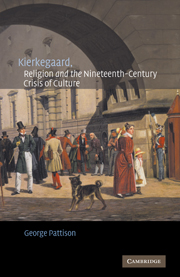Book contents
- Frontmatter
- Contents
- Preface
- Acknowledgements
- List of abbreviations
- 1 The sublime, the city and the present age
- 2 Kierkegaard and the world of the feuilletons
- 3 The present age: the age of the city
- 4 ‘Cosmopolitan faces’
- 5 Food for thought
- 6 A literary scandal
- 7 The reception of Either/Or
- 8 New Year's Day
- 9 Kierkegaard and the nineteenth century (1) Manet
- 10 Kierkegaard and the nineteenth century (2) Dostoevsky
- 11 Learning to read the signs of the times
- Bibliography
- Index
9 - Kierkegaard and the nineteenth century (1) Manet
Published online by Cambridge University Press: 22 September 2009
- Frontmatter
- Contents
- Preface
- Acknowledgements
- List of abbreviations
- 1 The sublime, the city and the present age
- 2 Kierkegaard and the world of the feuilletons
- 3 The present age: the age of the city
- 4 ‘Cosmopolitan faces’
- 5 Food for thought
- 6 A literary scandal
- 7 The reception of Either/Or
- 8 New Year's Day
- 9 Kierkegaard and the nineteenth century (1) Manet
- 10 Kierkegaard and the nineteenth century (2) Dostoevsky
- 11 Learning to read the signs of the times
- Bibliography
- Index
Summary
Apart from a couple of minor studies, some reviews and a few passing references, very little was written in English about Kierkegaard until after the First World War, and it was really only from the 1930s onwards that he became anything like well known in the English-speaking world as a major figure of modern thought. The situation was not dissimilar in France, and, if Kierkegaard had begun to be noticed in Germany in his own lifetime, the highpoint of his influence was from the 1920s onwards. Elsewhere the story of the reception of his work has mostly been even more fragmented and belated. The time-lag in what, after Habib C. Malik, might be called ‘receiving Søren Kierkegaard’ contributed to the perception that Kierkegaard was, somehow, a thinker who was born before his time, a prophet of the crises of the twentieth century, particularly with regard to the mutual alienation of Church and State, the advent of what was called ‘mass society’ and the consequent sense of isolation of the individual. The age that could be described by one of its leading poets, W. H. Auden, as ‘the age of anxiety’ was, it seemed, very much Kierkegaard's age. The obverse of acclaiming Kierkegaard as the prophet of twentieth-century alienation and anxiety was, almost inevitably, the prevalence of the view that prior to the social and cultural crisis resulting from the disaster of the First World War he had been undeservedly overlooked.
- Type
- Chapter
- Information
- Publisher: Cambridge University PressPrint publication year: 2002



